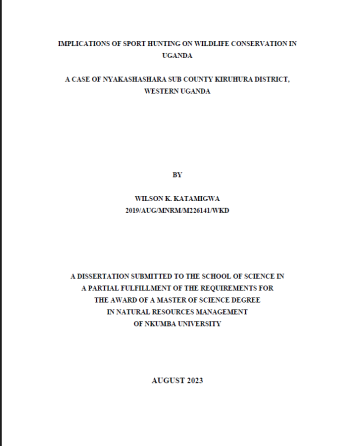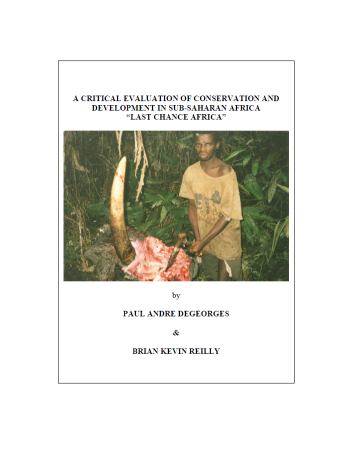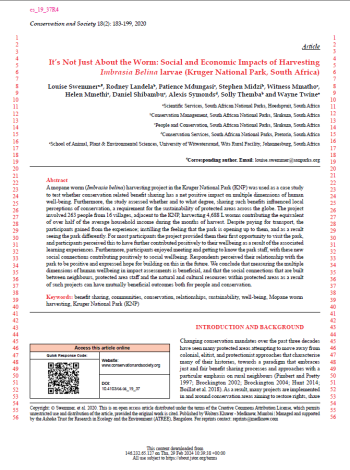

IMPLICATIONS OF SPORT HUNTING ON WILDLIFE CONSERVATION IN UGANDA
25 April 2024
A CASE OF NYAKASHASHARA SUB COUNTY KIRUHURA DISTRICT, WESTERN UGANDA
The study examined the implications of sport hunting on wildlife conservation in Rurambira and Nyakahita Parishes, Nyakasharara Sub County, Kiruhura District. Specifically, the study was aimed at establishing the socio-economic contributions of sport hunting, determining the perception of local communities towards sport hunting activities, and assessing the effect of sport hunting on the conservation of wildlife populations. A cross-sectional design was used for the survey. Quantitative and qualitative data were collected through the use of questionnaires and face-to-face interviews, respectively. Content analysis was the main technique for qualitative data analysis, and quantitative data was analyzed using SPSS. The results show that there are improvements in local community livelihoods; some people were of the view that sport hunting had encouraged conservation, hence a relatively positive attitude towards sport hunting activities. The study also showed that animal populations increased over time because of sport hunting. The findings reveal that sport hunting is desirable since it helps the local community and leads to a decline in poaching (r = 0.271**; p = 0.000). The popularity of sport hunting has increased in support of wildlife conservation (r = 0.301*; p = 0.001). The study further revealed that sport hunting increased community income and revenues, resulting in improved livelihoods and improved infrastructure that has enhanced wildlife conservation. There is a need to increase awareness about the sport hunting program and strengthen law enforcement by recruiting village wildlife scouts to work with sport hunting companies to curb poaching.
Key Words: Sport Hunting, Wildlife Conservation, Kiruhura District
Katamigwa, Wilson & Rusoke, Taddeo. (2023). IMPLICATIONS OF SPORT HUNTING ON WILDLIFE CONSERVATION IN UGANDA: A CASE OF NYAKASHASHARA SUB COUNTY KIRUHURA DISTRICT, WESTERN UGANDA..
Authors
-

Dr Taddeo Rusoke
Senior Fellow -
Wilson K Katamigwa
We support the free flow of information. Please share:
Form coming soon
Related Content
-

A CRITICAL EVALUATION OF CONSERVATION AND DEVELOPMENT IN SUB-SAHARAN AFRICA
ByPaul Andre DeGeorgesProf Brian Childarrow_forward2008 -

It’s Not Just About the Worm: Social and Economic Impacts of Harvesting
ByLouise SwemmerWayne TwineRodney LandelaPatience MdungasiStephen MidziWitness MmathoHelen MmethiDaniel ShibambuAlexis SymondsSolly Thembaarrow_forward2020 -

IMPLICATIONS OF SPORT HUNTING ON WILDLIFE CONSERVATION IN UGANDA
ByWilson K KatamigwaDr Taddeo Rusokearrow_forward2023
Get updates by email
In a complex and changing world, AWEI generates strategic ideas, conducts independent analysis on wildlife economies, and collaborates with global scholar-practitioners to provide training and expertise for biodiversity conservation, climate resilience, and inclusive economic opportunities in Africa.
Sign up for a quarterly dose of AWEI insights
In a complex and changing world, AWEI generates strategic ideas, conducts independent analysis on wildlife economies, and collaborates with global scholar-practitioners to provide training and expertise for biodiversity conservation, climate resilience, and inclusive economic opportunities in Africa.




